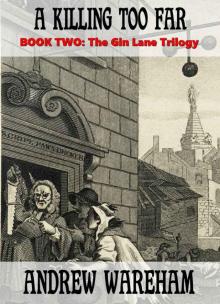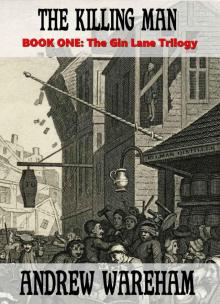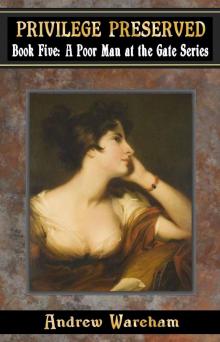- Home
- Andrew Wareham
The Soldier Brat (Man of Conflict Series, Book 1)
The Soldier Brat (Man of Conflict Series, Book 1) Read online
Man of Conflict Series
BOOK ONE
Digital edition published in 2015 by
The Electronic Book Company
A New York Times Best-seller
Listed Publisher
www.theelectronicbookcompany.com
www.facebook.com/quality.ebooks
This ebook is licensed for your personal enjoyment only. This ebook may not be re-sold or given away to other people. If you would like to share this ebook with another person, please purchase an additional copy for each recipient. If you’re reading this ebook and did not purchase it, or it was not purchased for your use only, then please purchase your own copy. Thank you for respecting the hard work of this author. This ebook contains detailed research material, combined with the author's own subjective opinions, which are open to debate. Any offence caused to persons either living or dead is purely unintentional. Factual references may include or present the author's own interpretation, based on research and study. The cover image is adapted from an original photograph by Loozrboy @ flickr.
The Soldier Brat
Copyright © 2015 by Andrew Wareham
All Rights Reserved
Contents:
Title Page
Copyright Page
Introduction
Chapter One
Chapter Two
Chapter Three
Chapter Four
Chapter Five
Chapter Six
Chapter Seven
Chapter Eight
Chapter Nine
Chapter Ten
Chapter Eleven
By the Same Author
Introduction
The Soldier Brat: Youngest son of a wealthy English merchant, Septimus Pearce is an utterly spoiled brat whose disgraceful conduct threatens his family’s good name. His father forces him to join the army in an attempt to reform him, but even the disciplines of army life where he sees bloody action in three countries fail to exorcise his nastier character traits.
Author’s Note: I have written and punctuated The Soldier Brat in a style reflecting English usage in novels of the period, when typically, sentences were much longer than they are in modern English. Editor’s Note: Andrew’s book was written, produced and edited in the UK where some of the spellings and word usage vary slightly from U.S. English.
Man of Conflict Series
BOOK ONE
Chapter One
The “Four pounds, three shillings and tuppence farthing! A month’s wages to my senior clerk! Well, sir? What is your excuse this time?”
Mr Pearce’s several chins and pendulous scarlet and grey mutton-chopped cheeks quivered in outrage. He slapped the legal foolscap brought an hour since by the parish constable onto the leather blotter on his much carved, ostentatious mahogany desk, one of the many proud signs of the successful man of business. He stared at his erring son, anger and incomprehension equally mixed – he could not understand the boy, almost a man in years but far removed from maturity it would seem.
Septimus stayed mute. He ran his hand through the tangled mop of chestnut ringlets, his mother's pride and joy, combed for him every day, rubbing his aching head; he was not sure that he could remember all that had happened the previous night. His knuckles were skinned, so he had been in a fight; he wasn’t bruised so he must have won; so far, so good. He had been on the spree with his friends from school, other merchants’ sons, most of them older than him but none bigger – Septimus was six feet tall and broad on the shoulders at seventeen. They said he took after his grandfather, the massive smith who had put his profits into a corn chandlery and then into rawhides and leather, and whose son, Septimus’ father, now had a finger in half the pies in the county. Septimus, the youngest by far of his family, had never met the old man, but had heard of his party trick of sitting his wife in a wooden chair and then lifting it in his teeth; he was envious, wondered if he would ever be that strong – maybe …
The family had become respectable, was moving up in the world, seeking power as well as wealth. The Pearces attended the Assemblies and danced, occasionally, with the gentry. Septimus’ five elder sisters were all well-married into the stratum immediately below the County; a vicar – a full rector, no mere curate; an attorney; three elder sons of the merchant community. The first-born, Septimus’ brother George, a man in his late thirties, sat at his father’s feet in the office, a model heir. But Septimus, the afterthought of middle-age, the spoiled brat of the family, was big, dour-faced and very, very noisy, not a pattern of rectitude.
At seventeen Septimus was causing a few eyebrows to raise, odd comments to be dropped almost in his father’s hearing and well within report; by the time he was twenty he promised to be an embarrassment to family and firm.
“Well, sir? Have you nothing to say? Broken furniture! Window glasses to replace! Apothecary’s attendance, no less! And where? Aye, well might I ask! A common drinking house, little more than a place of ill-repute! Words fail me, sir!”
Septimus reflected that it would be for the first time if that were indeed the case. What was wrong with the Old Man? A boy had to have a bit of fun, kick up a dust occasionally … as for the girls, well, that was natural enough, surely to God! It was all normal for a young man of his standing and no harm done, except to a few guttersnipes who got in the way, and they didn’t matter. All this fuss about a few shillings when the Old Man was worth thousands! He sighed impatiently, shrugged his shoulders.
“So, my son, you truly have nothing to say to me. I know better than to think it is because of shame.” The old face cleared, the blood suffusion of rage slowly ebbing as he, belatedly, applied his keen business brain to the problem that his youngest now represented. He nodded thoughtfully, regretfully, looked up slowly, assessing the resentful, sullen lump in front of him.
“The Counting House is not for you, it seems, and why should it be? You do not inherit, after all. I had hoped to have set you up in a small way of business of your own, that you might make your own fortune, once you had learned the ways of business; but you would waste every penny and end up in the gutter, very publicly, no doubt. So it must be another fate for you, my son. Go to your room, boy. Wash and change and I shall see you this evening at dinner, hopefully smelling less like a second-hand brewery!”
Septimus flung out of the door, humiliated, sulking under his father’s contemptuous dismissal; he had never received such treatment before. Pleas, remonstrations, despair – he had experienced all of those in the last few months, but never before the cold appraisal and scathing denigration. He sat and sulked over his book, an illicitly obtained Moll Flanders; it wasn’t anywhere near as good as he had hoped.
Pearce sat silently also, papers unattended on his desk, clerk dismissed when he brought a question to him. He was, at last, facing the reality of his younger son and did not like his conclusions. Septimus had been a bright, wilful, loving child but, in all honesty he had to admit to himself, he had been spoiled rotten, by the whole family. His next sister had been ten when Septimus was born, his mother nearly forty, Jonathan himself five years more. They had indulged the boy too much, disciplined him too little, and now must cope with the result.
The boy would not become a merchant. His school had requested that he be withdrawn, exactly why Pearce was unsure, suspected his son to have bumped into his headmaster in the door to the bawdy house; so University was out, which made the Church impossible and hardly appropriate in any case. He could be indentured to a local attorney, but would surely be dismissed within weeks for idleness and rowdiness. He was too old to go to sea either as midshipman or apprentice in the merchant service and Pearce
had no ‘in’ with John Company, could not send him out to India.
There was only one possibility other than the Americas and that was a pair of Colours; he could buy him his ensigncy, send him into the Army. But what regiment would take him, smelling of Trade, a merchant’s son with a not quite perfect accent? The Militia would take him, of course, almost all of their officers came from the merchant class, but he would still be here in Winchester and even more in the company of louts and rowdies and no-hope younger sons. If he was to go into the Army, and at least preserve his respectability, then a foreign posting would be the only answer; perhaps an unfashionable line regiment might be found.
Enquiry over several days disclosed that regiments of foot sent off to East or West Indies or Ireland commonly found themselves with officers wishing to exchange or go to their Second Battalion, remaining at base in England. The fevers of the Indies could kill two out of every three in the space of a seven year posting overseas; the damps and gloomy, resentful peasantry led many to send in their papers from Ireland. It was not too difficult to buy a vacancy in a regiment notified of such a posting and they would commonly overlook minor cracks in the patina of gentility in their concern to make up their numbers.
The Indies might be seen as too drastic but Ireland provided an elegant sufficiency – distant, but not usually fatal. A thousand pounds would purchase and equip the boy; two hundred a year allowance would make him let a fool of himself; another five hundred at intervals would pay off his debts. It amounted to the income of twenty thousand pounds, more than he had ever intended to leave the boy. A discussion with sober-sided brother, George brought reluctant agreement that it was not too great a price to pay for a clean name in the county. Together they composed instructions for their attorney in Winchester to send to the man he used in London and then wended their way homewards to their lawful, wedded wives.
Septimus that evening, unaware of his impending doom, set off to the Peter’s Finger, one of the oldest inns of Winchester, a half guinea and a couple of florins in his pocket. He walked briskly down the hill to the town centre, past the cathedral and over the river, up the narrow lane on the eastern side, ignoring the commonplace sights of the old stone town, his mind exclusively on the cock-fighting to come. The mains would take place in the barn to the rear of the pub and would attract little attention, none of the gentry would be present, but the gambling in sixpences and shillings would be fierce. A clever man with a clear head, betting not just on the winner but first blood and times as well, stood a good chance of coming out on the up and Septimus rarely lost over an evening. He would drink no more than two or three pints of mild ale, though he would shout and stamp as loud as any, and might take forty shillings out, and a guinea would buy him a whole night with Betsy at Mrs Ford’s. Betsy was young and pretty and blonde, best of the stable; he had only ever been able to afford a couple of hours with one of the older girls, and the lads said that Betsy let you take all of your clothes off, and hers.
The barn was big, could accommodate a cockpit and fifty or sixty men easily, was always empty except immediately after harvest when the landlord stored his brewing barley there before taking it off to the maltsters. Septimus collected a pint and eased into the crowd in the semi-darkness, most of the light reflection from the oil lamps over the wooden pit; he glanced around, moved towards a few more prosperously dressed men in one corner, looked towards the handlers on the apron of the pit. There were only eight birds, four mains, which would be spread over the better part of three hours, the intervals occupied by ratting – a hundred of the rodents tipped into the pit and a bull-terrier set on them, betting on the numbers killed in two minutes; a quick, skilled dog would kill more than half, often without being bitten himself.
Septimus laid bets on the cock-fights, kept his hands in his pockets during the ratting which he regarded as pure chance, the odds high and winners few. He made a pound on a big, slow black-feathered bird in the first main, backing its stamina to defeat a faster, flashier grey. He lost ten shillings on its equally heavy stable mate in the second, making more noise paying out than collecting – it was always wiser to be observed losing and ten shillings was big money here, more than a week’s take home pay for a labourer. On the third he hedged, backing a speckle for first blood, its common-looking opponent to win, was right on both counts and took in nearly three pounds. He shifted to a different place when they came back from the bar for the fourth main, the three pounds carefully tucked away in his belt when he went out to the back hedge to ease his bladder, the rest to hand as stakes.
The last two birds seemed identical, their weights much the same, both an undistinguished brown; he could only get evens from any of the punters about him. He laid out his pound in half crowns on the one bird, chosen at random, watched it jump in and slash wildly at the other’s head, blinding it in seconds with the metal spurs tied to its legs, killing it in an unexciting half minute.
He walked back into town, into the alleys behind the Close, dominated by the great, squat bulk of the cathedral, exchanged a greeting with the heavy on the door and slipped into the discreetly curtained parlour of Mrs Ford’s, was greeted by the madam herself, demanded Betsy, was told she was already busy for the night.
Mrs Ford, massively fat, on the shady side of forty, sufficiently clever to have saved her money and opened her own house, led him to a side room. Young merchant’s sons were too rare to be treated offhandedly, they were gold on the hoof, an income for many years to come.
“New come to the house today, Mr P. Do you take a look – just as big a favourite as Betsy, she’ll be!”
Septimus recoiled from the gin fumes on Mrs Ford’s breath as she whispered confidentially, stared appreciatively at the redhead sat nervously in the corner, huddled into herself. He dived his hand into his pocket.
“A guinea, Mrs Ford?”
She nodded, took the coins, urged the girl out of her chair and upstairs to a back room, somewhat removed from the ordinary working area of the house.
“I’ll be down the corridor this next half-hour, Mr P. Just give me a call if so be you ‘as any problems. But Jenny’s going to be a good girl, ain’t she?”
She caught Jenny’s eye, scowled menacingly until she received a mutter of agreement.
The door slammed firmly, the pair left in a windowless chamber occupied by a large bed and no other furniture at all other than a small stand occupied by a three branched candelabra. Septimus was already tugging at his boots, fumbling at the strings in his anxiety.
Jenny gulped back her tears and turned her back on him, slowly started to unbutton. She had been in service at a house in the village of Sparsholt for six months, had been raped by the butler in the first week and alternately by the master and his son thereafter. When the lady of the house had got wind of it on the previous day she had called her a whore and dismissed her without a character. The master, very kindly, had had her conveyed to Mrs Ford’s rather than leave her destitute on the streets.
“Hurry up!”
Septimus had no interest in her, wanted only one thing.
Later she snuffed two of the candles, in the hope he would sleep longer, and stared at the face of her first paying customer; she would remember him, perhaps she would get the chance to repay his courtesy and consideration one day. She was no longer near tears she discovered, had a strong suspicion she might never cry again. She settled on her side at the edge of the mattress, dozed off, carefully not touching the piece of meat sprawled across three quarters of the bed. She was thirteen, she thought, dropping off; definitely an unlucky number.
Strolling home soon after dawn, a beautiful spring morning, the two miles across the hillside above the River Itchen an invigorating pick-me-up, honing the edge of Septimus’ appetite for breakfast. Skylarks singing their hearts out, almost invisible, high across the lower fields; lambs playing on the rough pasture, still stiff-legged some of them, swans feeding on the river and along the Itchen Navigation, the oldest canal in England he had
been told, built in Norman times to carry stone to the cathedral – that was interesting, he thought, proper history, not the never-ending Latin and Greek that had driven him to distraction at school. Dabchicks on the banks, less cautious in the dawn, before they expected people; a water rat swimming; mallard ducks, the bright male forever rampant. Mosquitoes biting as he passed a stagnant cut-off, not so wonderful! It was a beautiful country, he mused, jingling the coins in his pocket and not even seeing a row of tumbledown labourers’ cottages, their menfolk already in the fields.
“Better than France,” he mused, “cutting heads off and revolting everywhere!”
None of his business on this fine morning – ham, fried eggs, a couple of slices of cold beef, bread fried in the egg fat; a pint at least of buttermilk and a cup of tea to follow, just right to set him up for the day, he needed it, he was starving! Small wonder, he chuckled – five times between ten o’clock and six! The lads would all whistle when he told them that up at the Bell when they met up on Monday evening.
He ate in the kitchen, Cook happy to set up a feast for her own Master Seppy who she had indulged since forever. He felt comfortable in the big basement, sat at the scrubbed white deal, eating off thick earthenware in the cooking smells, not dining daintily off china in the constraints of would-be gentility, so much more rigid than the real thing.
Cook smiled at her darling, guessing where he had been all night. So little Seppy was a man now – a real heart-breaker he would be, such a tall, strong, lusty, handsome young devil! She ignored the square face and indeterminate nose, concentrated on the strong chin and blue eyes and sweet smile, when he wasn’t sulking.
“Bright, sunshiny mornin’, Master Seppy! What be ‘e goin’ to do wi’ theeself today? Too good to moulder indoors!”

 A Killing Too Far
A Killing Too Far Killing's Reward
Killing's Reward A New Place
A New Place The Killing Man
The Killing Man Bold and Blooded
Bold and Blooded The Breaking Storm (Innocent No More Series, Book 2)
The Breaking Storm (Innocent No More Series, Book 2) Nobody’s Child
Nobody’s Child 04 Peking Nightmares (The Earl’s Other Son Series, #4)
04 Peking Nightmares (The Earl’s Other Son Series, #4) Red Man
Red Man Foreign Mud
Foreign Mud The Gathering Clouds (Innocent No More Series, Book 1)
The Gathering Clouds (Innocent No More Series, Book 1) 06 A Soldier’s Farewell (Man of Conflict #6)
06 A Soldier’s Farewell (Man of Conflict #6) Chinese Whispers
Chinese Whispers 02 Shanghai Dreams (The Earl’s Other Son #2)
02 Shanghai Dreams (The Earl’s Other Son #2) Hungry Harry: An Orphan in the Ranks
Hungry Harry: An Orphan in the Ranks A Wretched Victory (Innocents At War Series, Book 6)
A Wretched Victory (Innocents At War Series, Book 6) Illusions Of Change (A Poor Man at the Gate Series Book 6)
Illusions Of Change (A Poor Man at the Gate Series Book 6) The Wages Of Virtue (A Poor Man at the Gate Series, Book 8)
The Wages Of Virtue (A Poor Man at the Gate Series, Book 8) Blood and Famine (Man of Conflict Series, Book 4)
Blood and Famine (Man of Conflict Series, Book 4) The Friendly Sea (The Duty and Destiny Series, Book 1)
The Friendly Sea (The Duty and Destiny Series, Book 1) Bursting Balloons (Innocents At War Series, Book 5)
Bursting Balloons (Innocents At War Series, Book 5) The Death of Hope
The Death of Hope Deadly Shores (The Duty and Destiny Series, Book 11)
Deadly Shores (The Duty and Destiny Series, Book 11) The Vice Of Virtue (A Poor Man At The Gate Series Book 10)
The Vice Of Virtue (A Poor Man At The Gate Series Book 10) Virtue’s Reward (A Poor Man at the Gate Series, Book 11)
Virtue’s Reward (A Poor Man at the Gate Series, Book 11) A Deadly Caper (Innocents At War Series, Book 2)
A Deadly Caper (Innocents At War Series, Book 2) The Pain Of Privilege (A Poor Man at the Gate Series Book 4)
The Pain Of Privilege (A Poor Man at the Gate Series Book 4) Far Foreign (The Duty and Destiny Series, Book 9)
Far Foreign (The Duty and Destiny Series, Book 9) Shores of Barbary (The Duty and Destiny Series, Book 12)
Shores of Barbary (The Duty and Destiny Series, Book 12) The Odd-Job Man (The Duty and Destiny Series, Book 7)
The Odd-Job Man (The Duty and Destiny Series, Book 7) Fire and Folly (Man of Conflict Series Book 3)
Fire and Folly (Man of Conflict Series Book 3) A Victorian Gent (The Making of a Man Series, Book 1)
A Victorian Gent (The Making of a Man Series, Book 1) Sugar and Spice (The Duty and Destiny Series, Book 6)
Sugar and Spice (The Duty and Destiny Series, Book 6) Dark Days Of Summer (Innocents At War Series, Book 4)
Dark Days Of Summer (Innocents At War Series, Book 4) Dire Shenanigans (The Making of a Man Series, Book 2)
Dire Shenanigans (The Making of a Man Series, Book 2) The Fuzzy-Wuzzy Man (The Duty and Destiny Series, Book 3)
The Fuzzy-Wuzzy Man (The Duty and Destiny Series, Book 3) Privilege Preserved (A Poor Man at the Gate Series Book 5)
Privilege Preserved (A Poor Man at the Gate Series Book 5) No Longer A Game (Innocents At War Series, Book 3)
No Longer A Game (Innocents At War Series, Book 3) An Uncertain Peace (The Making of a Man Series, Book 3)
An Uncertain Peace (The Making of a Man Series, Book 3) Fortune And Glory (The Duty and Destiny Series, Book 5)
Fortune And Glory (The Duty and Destiny Series, Book 5) The Old Order (A Poor Man at the Gate Series Book 7)
The Old Order (A Poor Man at the Gate Series Book 7) A Place Called Home (Cannibal Country Trilogy, Book 2)
A Place Called Home (Cannibal Country Trilogy, Book 2) Nouveau Riche (A Poor Man at the Gate Series, Book 2)
Nouveau Riche (A Poor Man at the Gate Series, Book 2) The Privateersman (A Poor Man at the Gate Series Book 1)
The Privateersman (A Poor Man at the Gate Series Book 1) Britannia’s Son (The Duty and Destiny Series, Book 4)
Britannia’s Son (The Duty and Destiny Series, Book 4) Long Way Place (Cannibal Country Trilogy, Book 1)
Long Way Place (Cannibal Country Trilogy, Book 1) Spanish Tricks (Man of Conflict Series, Book 5)
Spanish Tricks (Man of Conflict Series, Book 5) A Parade Of Virtue (A Poor Man At The Gate Series Book 9)
A Parade Of Virtue (A Poor Man At The Gate Series Book 9) A Busy Season (The Duty and Destiny Series, Book 8)
A Busy Season (The Duty and Destiny Series, Book 8) Billy Bacon and the Soldier Slaves (Colonial Warrior Series, Book 1)
Billy Bacon and the Soldier Slaves (Colonial Warrior Series, Book 1) Raging Rajahs (Man of Conflict Series, Book 2)
Raging Rajahs (Man of Conflict Series, Book 2) Victorian Dawn (A Poor Man at the Gate Series, Book 12)
Victorian Dawn (A Poor Man at the Gate Series, Book 12) Born To Privilege (A Poor Man at the Gate Series Book 3)
Born To Privilege (A Poor Man at the Gate Series Book 3) The Soldier Brat (Man of Conflict Series, Book 1)
The Soldier Brat (Man of Conflict Series, Book 1)